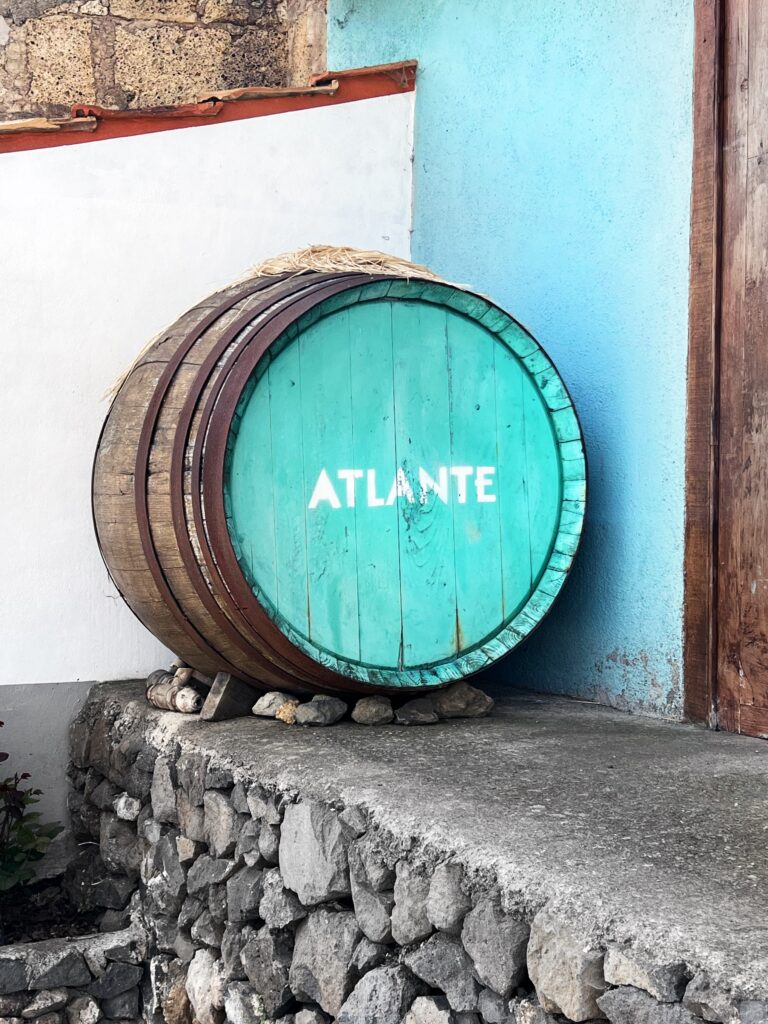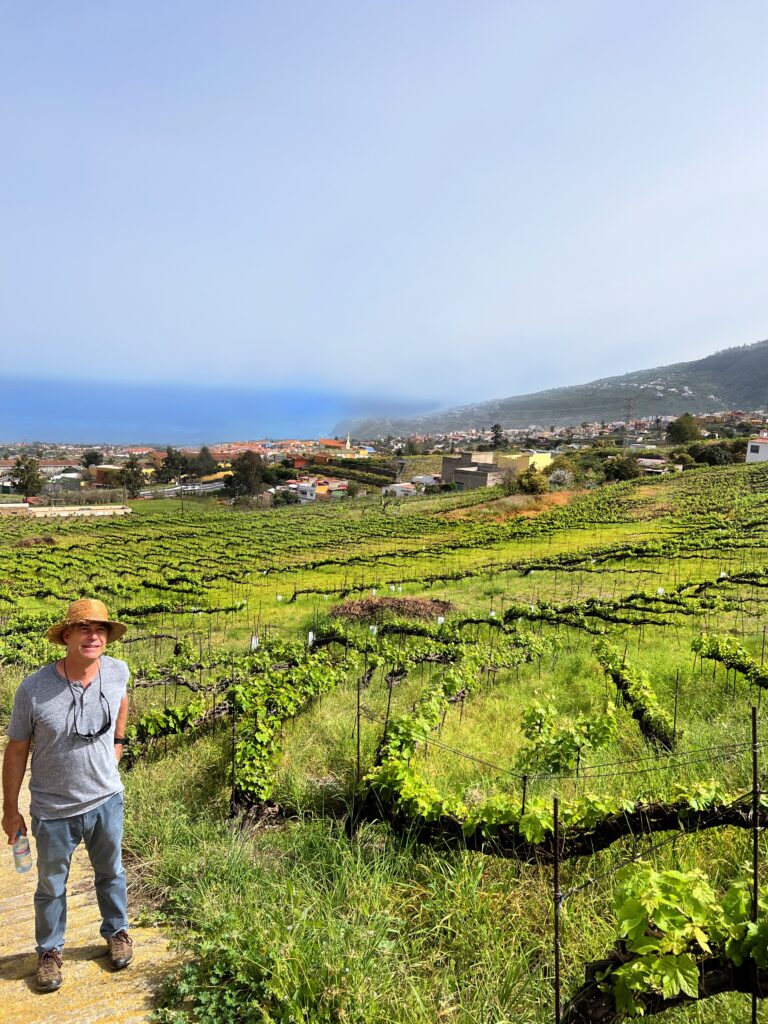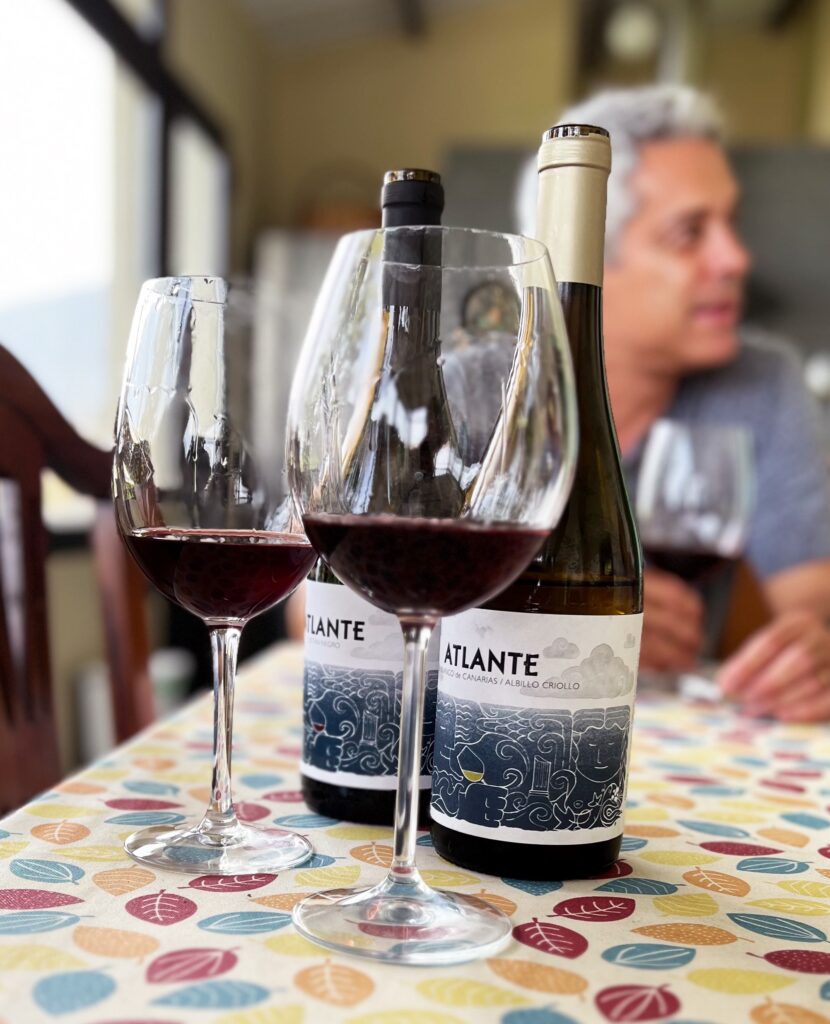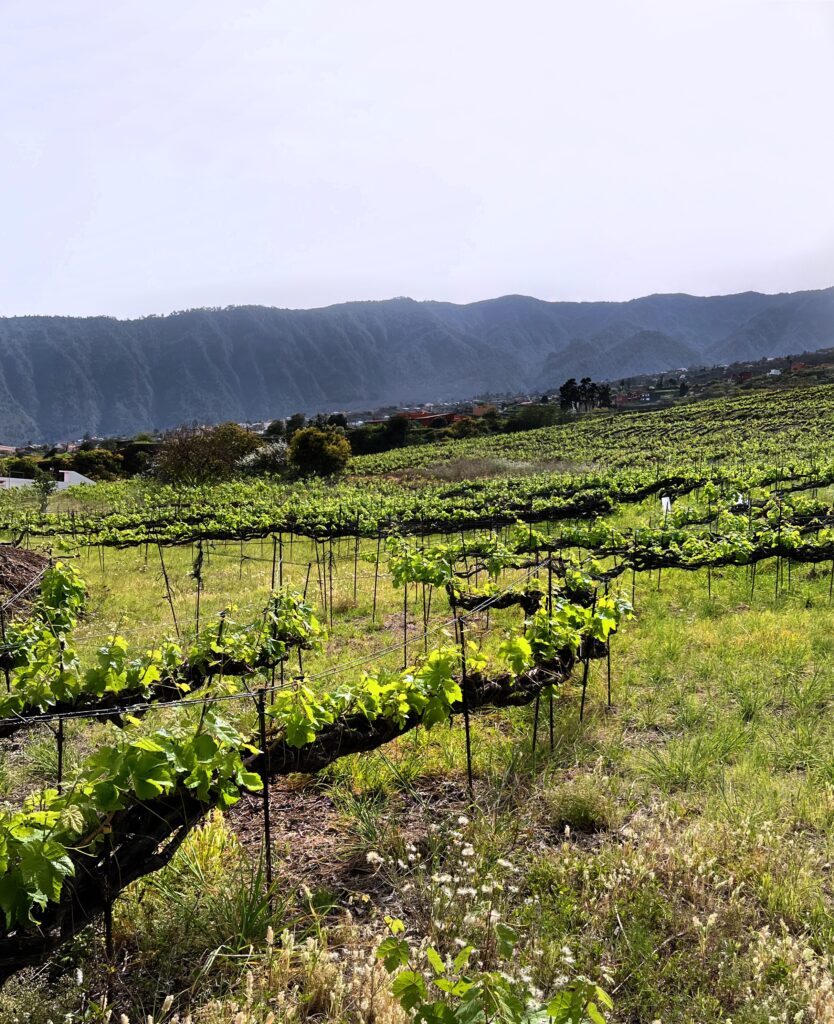 “Smarties???” I’ve got two Canarians looking at me with furrowed brows as I take another sip of an enthralling white wine. They lean closer, tilt their heads sideways a bit like dogs do when they don’t know whether to lick you or bite your face off, and repeat with even more inflection, “Smarties?? Really??”
“Smarties???” I’ve got two Canarians looking at me with furrowed brows as I take another sip of an enthralling white wine. They lean closer, tilt their heads sideways a bit like dogs do when they don’t know whether to lick you or bite your face off, and repeat with even more inflection, “Smarties?? Really??”
“Yes, Smarties. That’s what this wine reminds me of.” But, apparently their version of Smarties candies is completely different from mine, so I start frantically searching for a picture of them on my iPhone to avoid the oenological equivalent of taking a shit on someone’s family heirloom Persian rug. I show them the little tablets in their clear cellophane wrapping and they say, “Ohhhhhh! Here, Smarties are a chocolate-coated candy. That’s why we were confused! We call these little candies aspirina.” The furrowed brows relax and a Cheshire smile washes over Jesus’ face.
“It makes complete sense! When you bite them, there is chalkiness. And there’s a sense of both acidity and fruitiness. I have never had anyone make that connection before!” He nods with equal parts approval and understanding, and I’m pretty sure I’ve just succeeded in not only averting an international snafu but simultaneously impressing the dude who made the wine I’m so enamored with.
Being enamored was what found me on the north shore of Tenerife to begin with. I had been visiting a wine shop in Delray Beach and the owner turned me on to Envinate’s Migan, a sensuous, earthy, funky, seductive red from Valle de La Orotava—the exact region I was currently sitting in while jostling to avoid the snafu. I’d always had a thing for volcanic wines but when that Migan passed my lips, all it took was a text to my friend, Thea: I wanna go to the Canary Islands and taste through some wines. It was as simple as that. She was all in. A couple of flights later, we were traipsing through an island that immediately, intrinsically felt like a second home to me.
 Looking downward from Jesus’ steep vineyards, you can see the wide, crystal blue of the Atlantic Ocean with a lace of haze hovering just over it. Looking upward, you can see the impressively high crown of El Teide, the volcano that graces the island and whose eruptions and landslides created Atlante’s vineyards. The wine in my glass—made from albillo criollo and listan blanco—has a salinity and minerality that taste of both the ocean to my left and the volcano to my right. Its 13% ABV gives it these long, sexy legs that go for days and I find myself wishing my legs could do the same, but the damn 40° climb up his vineyards had completely betrayed mine. They weren’t long or sexy. Not so much. They were old and tired. But it was the most glorious sort of tired they could aspire to be. Tenerife is dizzying. Roads wind like sinew, and its terrain makes the slopes of San Francisco look like ant hills.
Looking downward from Jesus’ steep vineyards, you can see the wide, crystal blue of the Atlantic Ocean with a lace of haze hovering just over it. Looking upward, you can see the impressively high crown of El Teide, the volcano that graces the island and whose eruptions and landslides created Atlante’s vineyards. The wine in my glass—made from albillo criollo and listan blanco—has a salinity and minerality that taste of both the ocean to my left and the volcano to my right. Its 13% ABV gives it these long, sexy legs that go for days and I find myself wishing my legs could do the same, but the damn 40° climb up his vineyards had completely betrayed mine. They weren’t long or sexy. Not so much. They were old and tired. But it was the most glorious sort of tired they could aspire to be. Tenerife is dizzying. Roads wind like sinew, and its terrain makes the slopes of San Francisco look like ant hills.
Atlante’s pre-phylloxera vines, gnarled and braided, are at least 150 years old (but likely much more) and run parallel to the ground, stretched out over the arduous slopes like the arthritic fingers of some ancient, volcanic diety. What the islanders call cordon trenzado is a training system that plaits vines together, trellises them, and lets them grow anywhere from 10 to 50 feet in length. And while this system was originally designed as a space saver that left the ground below free for planting food, it also makes mechanical grape harvesting laughably impossible. Every last grape is collected by hand.
I continue sinking softly into his wines and Jesus beams as he discusses finally being able to live solely off of his wines and not have to work a second job. The Canary Islands aren’t exactly a place that trips off the tongue when discussing wines. Sun-soaked, beachfront vacations, sure. Wines, not so much. There are no shelves for them in the Spain section of Total Wine. Nobody’s holding free tastings of them from 12 – 2 at your local wine shop with some cute chick pouring listan negro into a plastic cup for you while she flashes you a smile and some cleavage. And they ain’t showing up in any wine-of-the-month clubs, either. In fact, the only way I can feed my monkey is by tolerating one insufferable shit show of a wine merchant in Miami that carries more than a handful of Canary bottles. So, Jesus being able to ditch the second job and rely only on his winery is a victory not easily understood by many outside these islands.
 Atlante’s vineyards are organically farmed, its wines are fermented using only indigenous wild yeasts, and the final product is neither filtered nor fined. But you don’t once hear the words “natural wine” spill out of Jesus’ mouth or see it on his labels. The nebulous term gets trampled under his boot heels and kicked off later for some slick marketing agency to lap up. There is plenty of chest pounding in this industry from winemakers who boast about their insistence that human intervention be minimal, but we all know what they say about good intentions and that road to hell. It’s not paved, folks. It’s riddled with potholes and it will dent your rims if you taste “natural wines” made by people more concerned with an ideology than they are with the final beverage. Jesus is making wines that taste of fruit, and sand, and clay, and sea salt. His listan negro has an almost indescribable nose and the only sensible notes I manage to scribble down are iron/red meat. It isn’t until days later that I realize that those vines grow in iron- and aluminum-rich basalts and then it all makes complete sense. He’s making wines that are an homage…a love song…a veritable sonnet…to his island.
Atlante’s vineyards are organically farmed, its wines are fermented using only indigenous wild yeasts, and the final product is neither filtered nor fined. But you don’t once hear the words “natural wine” spill out of Jesus’ mouth or see it on his labels. The nebulous term gets trampled under his boot heels and kicked off later for some slick marketing agency to lap up. There is plenty of chest pounding in this industry from winemakers who boast about their insistence that human intervention be minimal, but we all know what they say about good intentions and that road to hell. It’s not paved, folks. It’s riddled with potholes and it will dent your rims if you taste “natural wines” made by people more concerned with an ideology than they are with the final beverage. Jesus is making wines that taste of fruit, and sand, and clay, and sea salt. His listan negro has an almost indescribable nose and the only sensible notes I manage to scribble down are iron/red meat. It isn’t until days later that I realize that those vines grow in iron- and aluminum-rich basalts and then it all makes complete sense. He’s making wines that are an homage…a love song…a veritable sonnet…to his island.
The Canaries are so far removed from mainland Spain that most people don’t even know where the hell to find them on a map. They sit in the Atlantic, just west of Morocco, at 28° latitude N which is pretty much on par with Tampa, FL. Compare that to Madrid, which sits in the center of Spain and is even with central Jersey, and you’ll understand why Tenerife has as much in common with Rioja as Florida oranges have with Jersey tomatoes. These aren’t Spanish wines. Their identity is completely divorced from the ones made by the lispers up north. Go ahead and fight me—you’ll lose. Being called Spanish wines is a technicality at best. Much the same way that Don Q rum is Puerto Rican rum and not American rum, Tenerife’s wines (and that of the other islands) is Canary wine, not Spanish wine. Jesus didn’t say that, but his wines did.
We leave Atlante, but as excited as I may be to hit whatever’s next, I’m bummed. I want to sit at the sun-lit table and shoot the shit with Jesus for a few more hours. Taste through more of his wines. Ask incessant questions about the island’s winemaking history. Fold him up and pack him in my suitcase. But I resist the folding part, hop into Olga’s minivan, and watch Atlante disappear in the rear window, in a cloud of sand and volcanic dust.
 I once read an article that quoted Jonatan Garçia Lima of Suertes del Marqués winery as saying, “I would like to get to a point where people don’t think, ‘I’m ordering a volcanic wine’, but ‘I want to drink a Suertes del Marqués wine’. I’m taking a long-term view…looking at the bigger picture. I don’t just want to be a cellar of fashion, I want to be a classic. I want people to say, ‘This is a great wine’.” And I can’t help but call bullshit. It’s a false dichotomy. There are days when I say, “I want to drink an Atlante wine” and in those moments I am hyper-aware of the fact that what I want is a volcanic wine and that it is, without question, a great wine. These ideas aren’t mutually exclusive. They can coexist, assuming of course that the volcanic wine is, in fact, a great wine—which Atlante is. A great wine is many things, but ideally, it speaks of place—of terroir—and for Canary wines, that place is inarguably volcanic. To hope for that identity to eventually be stripped away is to hope for wines that get lost in the din of every other bottle out there. And that is a fool’s hope, to be sure.
I once read an article that quoted Jonatan Garçia Lima of Suertes del Marqués winery as saying, “I would like to get to a point where people don’t think, ‘I’m ordering a volcanic wine’, but ‘I want to drink a Suertes del Marqués wine’. I’m taking a long-term view…looking at the bigger picture. I don’t just want to be a cellar of fashion, I want to be a classic. I want people to say, ‘This is a great wine’.” And I can’t help but call bullshit. It’s a false dichotomy. There are days when I say, “I want to drink an Atlante wine” and in those moments I am hyper-aware of the fact that what I want is a volcanic wine and that it is, without question, a great wine. These ideas aren’t mutually exclusive. They can coexist, assuming of course that the volcanic wine is, in fact, a great wine—which Atlante is. A great wine is many things, but ideally, it speaks of place—of terroir—and for Canary wines, that place is inarguably volcanic. To hope for that identity to eventually be stripped away is to hope for wines that get lost in the din of every other bottle out there. And that is a fool’s hope, to be sure.
*NOTE: Atlante’s wines are just beginning to be imported into the US by Rosenthal Wine Merchant.



